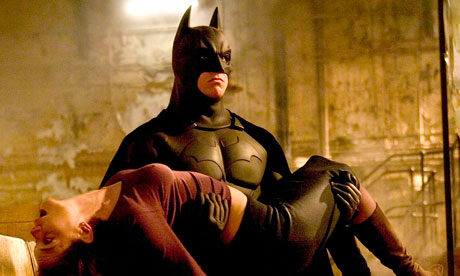
DC Comics' announcement that a high-profile superhero is about to come out – a response to Marvel's "gay wedding" story – has stirred up a lot of gossip, with one name repeatedly put forward, and regularly dismissed. Batman, gay? To some critics, it's entirely fitting. To some fans, it's slander.
I've studied Batman longer and harder than most; my PhD was a cultural history of the character. I don't think Batman will come out; because everyone already knows he's gay.
Picture the scene. Bruce gathers his friends and colleagues in the cave for a sombre ceremony. Candlelight glints off the robot dinosaur and the giant penny. That familiar growl; a catch in the voice. "I have … something I want to tell you all." He reveals his secret. Superman gasps in fake surprise, always the ham actor. Wonder Woman steps forward. "We're so glad you told us, honey." Green Lantern and The Flash exchange glances. "Was that it? We came to Gotham for this?" The heroes disperse, and life goes on exactly as it did before.
Is Batman gay? Well, no: Batman, after 73 years of publication, with appearances on TV, in video games, movies and comics, can never be tied down to any one identity. Batman has been a ridiculous boy-scout, a fearsome vigilante, a protective father, a loner, a clown. Batman is a myth and a mosaic, an icon who catches the light at different angles at different times, and takes multiple forms. But gayness – from high camp to intense homoeroticism – is an important aspect of that icon.
This reading is nothing new. Media scholar Andy Medhurst outlined it in an important 1991 article, Batman, Deviance and Camp. In the 60s, George Melly remarked of the Adam West TV show: "We all knew Robin and Batman were pouves." And in the 50s, young boys confessed to psychiatrist Fredric Wertham that they fantasied about sharing a bedroom with Batman.
Whenever that interpretation raises its head, it meets resistance. In the 50s, the accusations that Bruce and Dick "Robin" Grayson represented "a wish-dream of two homosexuals living together" went to a Senate subcommittee hearing, and the comic-book editors responded by bringing in Batgirl and Batwoman, double-dates for the dynamic duo. In the late 60s, DC Comics commissioned a new team to rebrand Batman with hard-boiled, street-level stories intended to wipe out the memory of Adam West's TV show. More recently, the publicity for Christopher Nolan's Batman Begins stressed military machismo. Once more, this "dark" Batman had a specific job to do: make people forget about Joel Schumacher's gaudy camp crusader of Batman & Robin (1997).
But nobody makes such a fuss about Superman being straight, or Green Arrow being into girls. The constant need to insist on Batman's heterosexuality always, unwittingly, reminds us of the campy incarnations as it tries to repress them; and the harder the push towards "darkness", the more the "rainbow Batman" sneaks through the gaps. By giving Bruce Wayne a string of short-lived girlfriends, you just make it clear that his longest loving relationship has been with Dick Grayson.
Frank Miller's All-Star Batman and Robin took machismo to the max with its depiction of the crazily unshaven "Goddamn Batman" – but it went so far, it crossed over into camp. Even Nolan's Dark Knight fails to exorcise the circus and panto of Schumacher's version. Gordon tells Batman that his new nemesis, Joker, has "a taste for the theatrical, like you", while Joker, consistently coded as queer, reminds Batman that "to them, you're just a freak … like me".
Camp is part of Batman's personality. Theatricality is at the heart of his identity. His closest relationships are always with men; his heterosexual romances inevitably flop, and are often revealed as just a social front.
So Batman coming out would only be telling his closest friends what they already know. The heroes would disperse, and life would go on exactly as it did before. But maybe something would change.
Bruce would be a little happier, a little less uptight, a little less tortured. He wouldn't have so much to prove, so much to hide. He wouldn't have to act like such a badass all the time. He might not growl so much.
And that's why Batman can't come out: because his whole character relies on him being in denial.
Batman is a dynamic figure, wrestling with different sides of his own personality, constantly shifting between different forms and resisting any single definition. If he came out as gay, he wouldn't be the moody, difficult figure we've grown to love; and ironically, by declaring himself as happily gay, Batman – as a cultural icon – would actually be less fascinating, less complex, less queer.
• Follow Comment is free on Twitter @commentisfree

